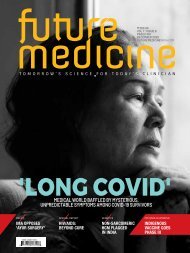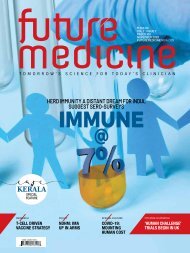FM DECEMBER 2018 ISSUE - digital edition
Create successful ePaper yourself
Turn your PDF publications into a flip-book with our unique Google optimized e-Paper software.
Transcranial stimulation to treat low back pain<br />
Sangtae Ahn et al reported that<br />
targeting a specific part of the brain<br />
with a weak alternating current of<br />
electricity significantly decreased chronic<br />
lower back pain (CLBP) in all participants<br />
of a small clinical trial. This treatment,<br />
known as Transcranial Alternating Current<br />
Stimulation (tACS), was used in a group<br />
of 20 patients based on the hypothesis<br />
that naturally occurring alpha oscillations<br />
associated with the thalamo-cortical<br />
activity pattern in the human brain are<br />
impaired in chronic pain and can be<br />
modulated. All patients were suffering<br />
from CLBP and were subjected to<br />
tACS and sham stimulation in different<br />
sessions. In one session the researchers<br />
targeted the somatosensory region using<br />
tACS to enhance the naturally occurring<br />
alpha-waves. The other session provided<br />
a weak untargeted electrical current<br />
for a placebo effect. The patients could<br />
not differentiate both the sessions. The<br />
findings revealed significantly<br />
enhanced alpha oscillations in<br />
the somatosensory regionon<br />
stimulation withalpha-tACS<br />
compared to placebo<br />
stimulation. The results, as<br />
recorded with EEG, were<br />
correlated with pain<br />
relief, giving successful<br />
target identification.<br />
Researchers plan<br />
on conducting<br />
a larger study<br />
to discover the<br />
effects of multiple<br />
tACS sessions,<br />
suggesting that it may<br />
provide a non-invasive<br />
therapeutic benefit for<br />
other brain associated<br />
disorders as well.<br />
The Journal of Pain DOI: https://doi.<br />
org/10.1016/j.jpain.<strong>2018</strong>.09.004<br />
compounds found in brewed coffee to<br />
alter the aggregation profile of amyloidbeta,<br />
tau and alpha-synuclein found<br />
associated with dementia. Three different<br />
types of coffee including light roast,<br />
dark roast, and decaffeinated dark roast<br />
and six different coffee components<br />
were analysed in the study. Of the<br />
various coffee components investigated,<br />
phenylindane was the only compound<br />
found to be a potent inhibitor of both<br />
amyloid-beta and tau aggregation, unlike<br />
other components. The study is the first<br />
to report on the aggregation inhibition<br />
activity of phenylindane for Ab, tau and<br />
a-synuclein. The researchers are currently<br />
involved in a further investigation on the<br />
cell and animal models for AD and PD<br />
based on the promising observations of<br />
the study.<br />
Frontiers in Neuroscience, <strong>2018</strong>; 12 October<br />
<strong>2018</strong>DOI: 10.3389/fnins.<strong>2018</strong>.00735<br />
Neck scan detects<br />
early chances of<br />
dementia<br />
Researchers from University College<br />
London (UCL) have found that a<br />
five-minute scan of blood vessels in<br />
the neck could predict the potential<br />
onset of dementia a decade before the<br />
appearance of any apparent symptoms.<br />
Led by Professor John Deanfield, the<br />
team of international researchers<br />
studied a group of 3,191 middle-aged<br />
volunteers who were given an ultrasound<br />
to measure the intensity of the pulse<br />
reaching their brain from the heart via<br />
the neck. Over the next 15 years, the<br />
participants were monitored for their<br />
memory and problem-solving ability.<br />
Participants whose blood reached<br />
their brain with the highest intensity<br />
(25%) at the beginning of the study<br />
showed 50% higher risk of developing<br />
cognitive decline over next decade<br />
compared to the rest of the participants.<br />
The research claims to reveal the first<br />
direct link between the heart's pulse<br />
transmitted towards the brain and<br />
future impairments in cognitive function.<br />
The research suggests that adopting a<br />
healthy lifestyle controlling the blood<br />
pressure and cholesterol levels is the way<br />
to help stave off vascular dementia. The<br />
researchers proclaim that the scan could<br />
become a routine screening programme<br />
for people at risk of developing dementia<br />
once it is confirmed in larger studies.<br />
University College London https://www.ucl.ac.uk/<br />
news/news-articles/1118/121118-neck-scan-<br />
Alzheimers<br />
—Compiled by Divya Choyikutty<br />
<strong>DECEMBER</strong> <strong>2018</strong> / FUTURE MEDICINE / 53


















